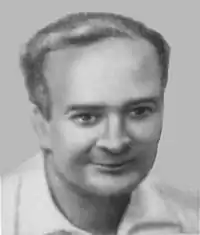Boris Hessen
Boris Mikhailovich Hessen (Russian: Бори́с Миха́йлович Ге́ссен), also Gessen (16 August 1893, Elisavetgrad – 20 December 1936, Moscow),[1] was a Soviet physicist, philosopher and historian of science. He is most famous for his paper on Newton's Principia which became foundational in historiography of science.

Biography
Boris Hessen was born to a Jewish family in Elisavetgrad, in the Kherson Governorate of the Russian Empire (now Kropyvnytskyi, Ukraine). He studied physics and natural sciences at the University of Edinburgh (1913—1914) together with his gymnasium school friend Igor Tamm. He then went to study at the St. Petersburg University (1914—1917). He enlisted in the Red Army in the Russian Civil War, joined the Communist Party in 1919 and became a member of the Revolutionary Military Council (1919—1921). He also continued his physics studies at various places eventually graduating from the Red Professor's Institute in Moscow in 1928. In this year he was criticised by Alexander Maximov, who criticised him for being a "machist" and "right deviationist".[2]
After working in the institute for two more years, he became a physics professor and the chair of the physics department at the Moscow State University in 1931. In 1933 he was elected a member of the Russian Academy of Sciences.
In 1931, Hessen delivered his famous paper "The Socio-Economic Roots of Newton's Principia" at the Second International Congress of the History of Science in London. This work became foundational in the history of science and led to modern studies of scientific revolutions and sociology of science.[3]
From 1934 to 1936 Hessen was a deputy director of the Physics Institute in Moscow headed by S.I. Vavilov. On 22 August 1936 Hessen was arrested by the NKVD. He was secretly tried for terrorism by a military tribunal together with his gymnasium school teacher Arkadij O. Apirin. They were found guilty on 20 December 1936 and were executed by shooting the same day. On 21 April 1956 both Apirin and Hessen were rehabilitated (posthumously exonerated).
See also
Writings
- Boris Hessen, The Social and Economic Roots of Newton's Principia in: Nicolai I. Bukharin, Science at the Crossroads, London 1931 (Reprint New York 1971), pp. 151–212 (Russian original: ).
- New English translation in: Gideon Freudenthal and Peter McLaughlin, The Social and Economic Roots of the Scientific Revolution, Springer, 2009, pp. 41–101.
- Boris Hessen, "Preface to Articles by A. Einstein and J.J. Thomson," trans. Sean Winkler, Society and Politics 13.1 (2019): 87 - 102. http://socpol.uvvg.ro/docs/2019-1/5.Hessen.pdf.
- Classical Physics in Context (unpublished text- and sourcebook, in preparation with Edizioni Ca'Foscari Venice).
References
- Gideon Freudenthal, "The Hessen-Grossman Thesis: An Attempt at Rehabilitation" in: Perspectives on Science, Summer 2005, Vol. 13, No. 2, Pages 166-193
- Loren R. Graham, "The Socio-Political Roots of Boris Hessen: Soviet Marxism and the History of Science" in: Social Studies of Science, Vol. 15, No. 4 (Nov., 1985), pp. 705–722
- Gideon Freudenthal and Peter McLaughlin, "Boris Hessen: In Lieu of a Biography" in: The Social and Economic Roots of the Scientific Revolution, Springer, 2009, 253-256.
- Pablo Huerga Melcón, La ciencia en la encrucijada. Análisis crítico de la célebre ponencia de Boris Mihailovich Hessen, "Las raíces socioeconómicas de la mecánica de Newton", desde las coordenadas del materialismo filosófico", Biblioteca Filosofía en español, Fundación Gustavo Bueno,Pentalfa ediciones, Oviedo 1999. (Con prólogo de Serguei Kara-Murza)
- Boris Hessen, Le radici sociali ed economiche della meccanica di Newton (a cura di Gerardo Ienna; Saggio Introduttivo Gerardo Ienna e Giulia Rispoli; Postfazione Pietro Daniel Omodeo) Castelvecchi, 2017.
- Boris Hessen, "Las raíces socioeconómicas de la mecánica de Newton", (edición, introducción y notas de Pablo Huerga Melcón) en El Catoblepas. Revista crítica del presente, 2010, nº 100. Enlace
External links
- Hessen's short biography (in Russian)
- Memorial Society record of Hessen's arrest and execution (in Russian)
- Physics in Moscow in 1937 – an article by G.E. Gorelik (in Russian)
- HISMAT | HESSEN at www.ucm.es -biography by Pablo Huerga Melcón (in Spanish)
Remarks
- The date of death is given incorrectly in most sources, including the Russian Academy of Sciences web site . The exact date was determined recently by the Russian society Memorial.
- Graham, Loren R. (1985). "The Socio-Political Roots of Boris Hessen: Soviet Marxism and the History of Science". Social Studies of Science. 15 (4): 705–722. doi:10.1177/030631285015004005. ISSN 0306-3127. JSTOR 285401. S2CID 143937146.
- Ienna, Gerardo; Rispoli, Giulia (2019). "Boris Hessen at the Crossroads of Science and Ideology". Society and Politics. 13 (No.1 (25) April 2019): 37–63. Retrieved 20 May 2019.